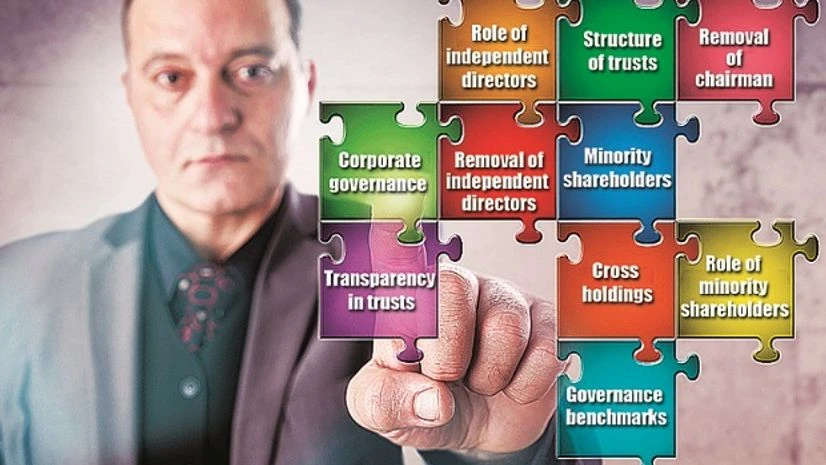India Inc appears divided on the collateral damage that the Tata-Mistry boardroom battle has inflicted on the corporate governance framework. The events that have played out over the past 55-odd days have, among other issues, raised questions over appointment of independent directors, their ‘independence’, and the manner in which they can be removed; put the spotlight over control games that diversified groups play through cross-holdings and use of private and charitable trusts; the need for more transparency in operation of trusts, and whether there is a need to adopt a uniform code of corporate governance.
“The recent events test the outreach of company law and the corporate governance framework,” says Shailesh Haribhakti, chief executive officer and managing director of the Haribhakti group. Even as the courts and the forthcoming extraordinary general meetings (EGM) of three Tata group companies decide the fate of Nusli Wadia as an independent director, questions are being asked whether there is a need for providing more protection to the institution of the independent director. However, the jury appears divided over the issue.
Arun Duggal, an experienced independent director and board chairman, feels that the bar for removal of independent directors, unless for violation of law, should be very high, requiring due process and vote by majority of minority shareholders. Shriram Subramanian, managing director, InGovern Research Services, too, agrees that independent directors need to be given more protection when it comes to their removal. According to Section 169 of the Companies Act, 2013, a company can through an ordinary resolution remove a director before the expiry of his term. While shareholders are not needed to provide a reason for moving a proposal for removal, the director has the right to defend his or her position, in writing or orally.
More From This Section
Unlike many developed economies, in India companies are usually closely held and controlled, and independent directors are seen as protectors of minority or public shareholders, says Debanshu Mukherjee, senior resident fellow, Vidhi Centre for Legal Policy. “But, this does not take away from the basic principle that independent directors, like all directors, are primarily accountable to the shareholders of the company in general,” he says.
Kavil Ramachandran, executive director, Thomas Schmidheiny Centre for Family Enterprise at the Indian School of Business, points out that existing laws provide for punishing independent directors for anything happening in companies. “There is a limit to what such directors can know with the best of efforts and intentions, particularly given the extent of involvement or exposure such directors have or can have in the operations of a company,” says Ramachandran.
Many are in favour of a push towards a cleaner and less conflicted structure of holding in a diversified group. “The extent of cross-holding and use of private trusts, not to mention charitable trusts, in control games should be minimised,” says Sandeep Parekh, managing partner at Finsec Law Advisors. Though company law has made a frontal attack on related party transactions, it has somehow missed out on this more complex area, he feels. Ramachandran is in favour of bringing more clarity in the role of holding companies in a diversified group through specific provisions in the Articles of Association. “There is no substitute for detailed discussion among the directors, particularly between the promoters and independent directors on the one hand and the boards of the holding company and group companies, on the other,” he says.
Rohit Kochhar, managing partner, Kochhar & Co, suggests a way forward: “The holding company should be considered as a shadow director of the group company and held responsible for the advice, directions or instructions given to the board of directors of group companies.” This will impose fiduciary and other obligations on the holding company, similar to those of a director, while indirectly influencing decisions on behalf of such group companies, he says.
There is near unanimity among corporate governance and legal experts of a need for more transparency in the operation of the trusts. “Trustees’ role should be to maximise the trust's charitable objectives. They should not become involved in management of the corpus of the trust, which should be done by a separate professional body,” says Duggal. “A lot more transparency is needed in their governance. A start can be made by improving public disclosure of charitable trusts,” says Parekh. One way forward, feels Robin Banerjee, managing director, Caprihans India, and convenor (finance & taxation panel), Confederation of Indian Industry, is to ensure that trusts beyond a particular size are made more publicly accountable.
Subramanian of InGovern points out that the recent events have highlighted that there is no clarity over the power of the chairman emeritus in a company. “There is no legal definition of chairman emeritus under the company law,” he says.
Duggal feels that removal of a chairman by the majority shareholder, unless for serious governance failures, should follow due process and be considered a change of control event under SEBI regulations. Some legal experts, like Kochhar, feel the need for adopting a uniform code of corporate governance. In India, corporate governance norms are covered under various statutes and regulations such as the Companies Act, 2013, SEBI laws, secretarial standards, and SEBI (Listing Obligations and Disclosure Requirements). “This creates confusion as well as conflict,” says Kochhar.

)
